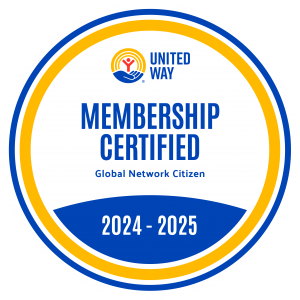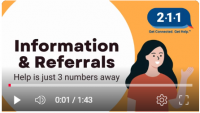
United Way mobilizes communities to action so all can thrive. We see how our communities' greatest challenges are connected, and how we can bring people and resources together to address them.
From strengthening local resilience to advancing health, youth opportunity, and financial security, we're working toward a future where every person in every community can reach their full potential.
United Way of Central Illinois fosters and promotes an inclusive environment that leverages the unique contributions of diverse individuals and organizations so that we can collectively and effectively create opportunities for a better life for all.
We focus on promoting an inclusive environment, not just in employment, but in every aspect of our business, where everyone respects and values the contributions of all people. The different backgrounds, experiences, abilities and perspectives of our community strengthen the quality of our work and the success of our organizations.
November 1922 — The Chamber of Commerce felt that a Community Chest and a central body of health and welfare agencies were needed in the community.
March 1923 — The constitution of the newly formed Springfield Council of Social Agencies was passed. Mr. Robert C. Lanphier served as the Chair, and about $150,000 was raised.
1934 — The name was changed to Associated Welfare Agencies, with Fred Schrader serving as President and Robert Troxell serving as Campaign Chairman. Approximately $112,000 was raised during this year.
1939 — George A. Bengal, President, and George E. Day, Campaign Chairman, again reorganized and changed the name to The Springfield Community Chest. Another $150,000 was raised during this year.
United Way 1945 Poster
1942 — After additional reorganization, the name was changed to The War Fund Council. Leadership included Edward S. Perry serving as President and Leon E. Fisher serving as Campaign Chairman. $340,000 was raised under their leadership.
1946 — This year marked another time of reorganization and revamping for the organization, as its name was changed to The Community Chest of Springfield and Sangamon County. Van Courtney Crane, serving as President, and Thomas F. Paris, serving as Campaign Chairman, together raised $270,000.
1955 — George K. Blanchard, President, and James H. Patton, Campaign Chairman, decided to take a slightly different direction by including a larger territory and changing the name of the organization to United Community Services of Springfield and Sangamon County. During this year, $370,000 was raised.
1971 — This was the first campaign to raise over $1 million. Funds raised were approximately $1,026,000 under the leadership of John R. Chapin as President and John M. Bunn as Campaign Chairman.
original uw logo
1975 — United Community Funds joined 2,200 local United Ways around the country by becoming the United Way of Sangamon County. The organization was under the leadership of Halbert A. Schussele as President and William R. Schnirring as Campaign Chairman, and about $1,310,000 was raised during this year.
1980 — Howard C. Humphrey as President and Douglas S. Freyder as Campaign Chairman raised $1,850,000 during this year, and the organization’s name was changed to United Way of Sangamon County, Inc.
1981 — The campaign surpassed the 2 million dollar mark under the leadership of Paul F. Mahon, MD as President and Arthur F. Quem as Campaign Chairman.
1995 — The organization’s name was changed to the United Way of Central Illinois, Inc. to reflect the organization’s service throughout the region. During this year, Dr. Robert C. Hill was Chairman of the Board and Gary D. Neubauer was the Campaign Chairman. This campaign raised about $2,536,000.
1996 — Dr. Robert C. Hill was the President of the Board of Directors and Robert A. Stuart, Jr. was the Campaign Chair. $2,525,638 was raised during this year.
1997 — The United Way of Central Illinois implemented a 100% message, under which selected corporate gifts underwrote all expenses associated with the Community Fund. Volunteer leadership included Ronald L. Wanless as Board Chair and Richard D. Barclay as Campaign Chair. The campaigns raised $2,442,315 during this year.
2001 — Following the events of September 11, 2001, the United Way of Central Illinois raised $2,810,117, which was the most ever raised to that point. Volunteer leadership included Dr. Glen Cope as Board Chair and Gene and Elaine Wilkinson as Campaign Co-Chairs.
2006 — The campaign surpassed the 3 million dollar mark under the leadership of Harry Mitchell as Board Chair and Susan Wallace as Campaign Chair.
TODAY — United Way of Central Illinois is the largest private funder of health and human services in Sangamon and Menard Counties.
United Way of Central Illinois provides grants and resources to effective human services programs across our community.
Diverse volunteers and subject matter experts review the grant applications and reports to ensure the commitment to the betterment to our community. All decisions are made by volunteers after multiple levels of review.
Types of Funding
Visit OUR IMPACT for more information about the local services provided by United Way Funding from the Community Fund.
Paramount to the work at United Way is investing in our local health and human service programs. We do this by raising funds during our annual United Way campaign. When a donor makes a contribution to the Community Fund, 100% of that gift goes to support local program services. From this fund, we allocate over a million dollars each year to programs creating positive, long-lasting change in the lives of individuals and families. United Way is the largest private funder of health and human services in Sangamon County.
Funding decisions are made by knowledgeable volunteers from our community. They undergo training, participate in community conversations, review data, read program funding applications, score them, discuss them, interview program representatives and after well over 1,000 hours of work, make funding recommendations to United Way’s Community Impact Committee and Board of Directors for approval.
All funded programs are aligned with United Way’s priorities and strategies based upon our focus of:
protecting services vital to the immediate Basic Needs of the most vulnerable members of our community; while
making long term investments in Education, Financial Stability and Health, because these are the building blocks for a good quality of life

The Emergency Food and Shelter Program began in 1983 with a $50 million federal appropriation. The program was created by Congress to help meet the needs of hungry and homeless people throughout the United States and its territories by allocating federal funds for the provision of food and shelter.
The program is governed by a National Board composed of representatives of the American Red Cross; Catholic Charities, USA; The Jewish Federations of North America; National Council of the Churches of Christ in the USA; The Salvation Army; and United Way Worldwide. The Board is chaired by a representative of the Federal Emergency Management Agency (FEMA).
During its 40 years of operation, the program disbursed over $6.5 billion to over 14,000 local providers in more than 2,500 counties and cities.
United Way of Central Illinois serves as the convener of the local EFSP board. Locally, the Emergency Food and Shelter Program has disbursed more than $1.3 million to local programs since 2000.
EFSP Guiding Principles are:
- Efficiency—fiscal administration, reporting and procedural guidance to Local Boards and LROs
- Accountability—good steward of taxpayers’ dollars through reasonable oversight and transparency
- Responsiveness—prioritize the allocation of supplemental funds to the neediest areas in the nation
- Partnership—promote and strengthen collaboration between non-profit organizations and public sector
- Facilitating—maximizing appropriate local decision-making through clear guidance and training
Program funds are used to provide the following, as determined by the Local Board in funded jurisdictions:
- Food, in the form of served meals or groceries.
- Lodging in a mass shelter or hotel.
- One month’s rent or mortgage payment.
- One month’s utility bill.
- Equipment necessary to feed or shelter people, up to a $300 limit per item.
Local EFSP Board announces call for applications for Phase 42 of the Emergency Food and Shelter Program
Local organizations, whether nonprofit or governmental, may apply. The Local Board will consider all applications and determine which organizations will receive funds.
To request an application, please contact the Local Board Administrator, Karen Gedrose at kgedrose@uwcil.org.




.png)